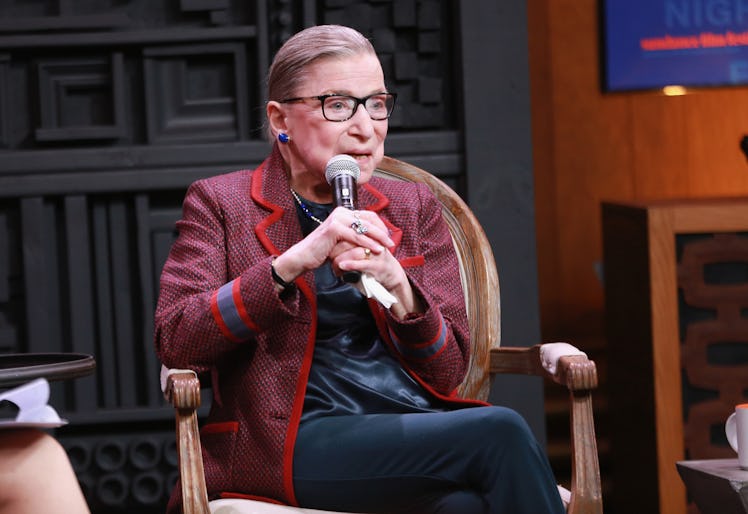
The Supreme Court Made A Major Ruling On Work & RBG Is REALLY Not Happy About It
A divided Supreme Court struck down a measure that would have protected workers' rights on Monday, May 21. The decision was won by the conservative members of the court, who ruled in favor of the pro-business move 5-4, but the dissenters didn't sit quietly. Ruth Bader Ginsburg's dissent on the Supreme Court's worker's rights ruling is a biting take on the court decision.
The ruling allows businesses to force employees to use arbitration in disputes, which settles legal disputes outside of the court, as an alternative to allowing employees to file class-action lawsuits (i.e. a bunch of employees file a lawsuit all together), per The New York Times. NBC News, and other outlets, characterized the decision as a win for business interests over worker's rights, because it allows companies to include language that forbids class action lawsuits in routine arbitration agreements that employees sign.
Ginsburg called the decision "egregiously wrong," and she read from her written dissent while seated at the bench, per The New York Times, which is a big sign that she loudly disagreed with the court's majority ruling. She added that the decision will lead to "huge under-enforcement of federal and state statutes designed to advance the well being of vulnerable workers."
About 25 million employees work under contracts that bar them from filing class action lawsuits about their work, per NBC News. That language is often buried in routine contracts that employees sign — and then later discover prevents them from taking collective legal action.
In a move that will surprise exactly no one, the Trump administration decided to break with the Obama administration's backing of employees in the dispute — opting to support the businesses. The Supreme Court, as well as the White House and both houses of Congress, are held by a Republican majority, which largely explains the pro-business stance on the issue across the board. Still, the care with which Ginsburg formulated her dissent suggests that she felt strongly that the decision was a bad move. Ginsburg continued, saying,
Suits to enforce workplace rights collectively fit comfortably under the umbrella 'concerted activities for the purpose of . . . mutual aid or protection.' ... When employees meet the requirements for litigation of shared legal claims in joint, collective, and class proceedings, the litigation of their claims is undoubtedly 'accomplished together.' By joining hands in litigation, workers can spread the costs of litigation and reduce the risk of employer retaliation.
Ginsburg said that the idea that employees are better served by individual arbitration does not come from Congress, but rather by "take-it-or-leave-it labor contracts."
"The FAA demands no such suppression of the right of workers to take concerted action for their 'mutual aid or protection,'" Ginsburg added.
The 5-4 split suggests that the relatively-new makeup of the Supreme Court is likely to continue to be divided on many of this ideological issues. Justice Neil Gorsuch, who was appointed by President Donald Trump in April 2017 to fill a vacancy, wrote for the majority that the federal law was clear that arbitration was favored. If workers were allowed to file class action suits, Gorsuch said, “the virtues Congress originally saw in arbitration, its speed and simplicity and inexpensiveness, would be shorn away and arbitration would wind up looking like the litigation it was meant to displace.”
NPR reported that Ginsburg's dissent was five pages longer than the majority's opinion. Other outlets too, took note of how fired up Ginsburg appeared to be by the decision, noting that her taking the time to read from her dissent from the bench likely was meant to be a statement.
The Supreme Court first heard oral arguments in three separate forced arbitration cases in October 2017, per USA Today. The major business trade groups had since backed the three corporate employers: Epic Systems, a Wisconsin-based healthcare software company; Ernst & Young; and Murphy Oil, which has gas stations in 26 states.
Ginsburg closed out her remarks by asking Congress to intervene — a tactic she reportedly used in 2007 to get Congress to correct a ruling against a woman who sued for equal pay.
"Congressional action is urgently in order to correct the court's elevation of the Arbitration Act over workers' rights to act in concert," Ginsburg said.